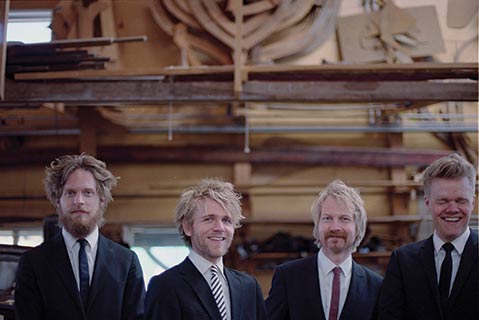The Danish String Quartet’s Fellowship of the Bow
The Danish String Quartet Heads to Hahn Hall on November 18

Like a Viking version of The Fab Four, the Danish String Quartet (DSQ) is a quad of musicians who wear their achievements and fame with good-natured detachment. Publicity photos depict the 30-year-olds’ attire as rumpled-chic — mussed dirty blond mops, scruffy and cheery (a nice reprieve from the deadpan and manicured pics of other classical press kits). Their website is warmly personal and hilariously self-effacing: “We are simply your friendly neighborhood string quartet with above average amounts of beard.” In short, this foursome of three Danes and a Norwegian has learned to play serious music seriously well without taking themselves too seriously. But if they were ever tempted to gloat, you could hardly blame them. In 2011, the DSQ was awarded the Carl Nielsen Prize, one of Denmark’s most prestigious arts awards. Their moniker alone is an awesome mantle, inherited through mentor Tim Frederiksen, who played violin in a previous incarnation of the DSQ (1985-1996). Destiny bound the Danes from an early age: Rune Sørensen (violin), Frederik Øland (violin), and Asbjørn Nørgaard (viola) were preteen music and football buddies. With Frederiksen’s interest and coaching, the boys cohered into a formidable string unit by their mid-teens. Norwegian cellist Fredrik Schøyen Sjölin joined the fellowship of the bow in 2008. The Santa Barbara Independent spoke with Sørensen by Skype recently at his home in Copenhagen.
The DSQ has received accolades for recordings of Carl Nielsen’s quartets. What is special and compelling about Nielsen? His chamber music is not so widely known. The symphonies are played a little bit more — that’s what he’s most famous for outside of Denmark. Not to compare him to Beethoven, but in Beethoven’s quartets he also showed a very clear development from the early “Op. 18” to the late quartets — there’s a very big difference. You can also hear that in Nielsen’s quartets. The first one he wrote when he was in his twenties, and you can call it immature in some ways, maybe not that interesting in the middle parts; the second violin and viola are more accompanying voices. But in the last quartet, it’s really four fully equal parts. People say he really found his own voice there and his own musical language. The last quartet really doesn’t sound like anything else; it sounds like Nielsen. And what’s the Nielsen sound? It’s something with a lightness, with very imaginative modulations. Then there is the sarcastic element, as well — the Danish humor.
The program in Santa Barbara will include a new piece by a contemporary Dane, Thomas Agerfeldt Olesen. Yes. We commissioned this piece with him a couple of years ago when we received the same award, the Carl Nielsen Award, and went to the ceremony and talked with him. We listened to his music, his early string quartets, and found that they were very good, indeed. We hadn’t really been commissioning pieces before, so we thought, “Yeah, let’s try to do this.” We got the piece here this summer, and now we’ve played it four times — and it’s not easy. Thomas is going through [a] tough time in life. There is some struggle in this music, maybe even desperation. The title is, of course, a tip of hat to Nielsen because his fourth symphony was called “The Inextinguishable,” and this one is called “The Extinguishable.” Olesen is not so sure that Nielsen’s way of seeing music and life was true. Things have [an] end, and life also has an end.
I’m so excited that you will be playing Beethoven Quartet No. 14, Op. 131. I have wept listening to that; the whole world is in that piece. It’s true. You know, our old mentor and teacher [Tim Frederiksen] always said, “The Beethoven ‘131’ — that’s a quartet for life.” He really meant it. You can play that all your life, and it will be still as moving and deep and fantastic as when you heard it for the first time.
4·1·1
UCSB Arts & Lectures presents the Danish String Quartet at the Music Academy of the West’s Hahn Hall (1070 Fairway Rd.) on Tuesday, November 18, at 7 p.m. Call (805) 893-3535 or visit artsandlectures.sa.ucsb.edu for tickets and info.



